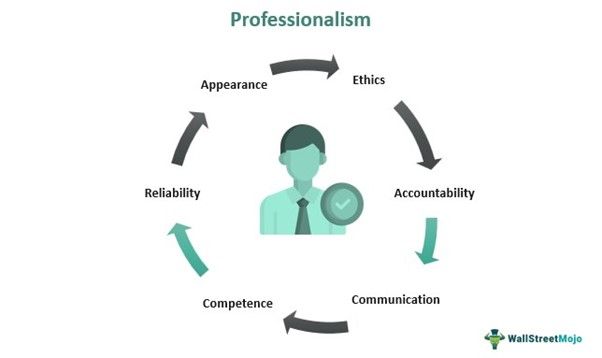Table Of Contents
Professionalism Meaning
Professionalism is a person's abilities, competence, and behavior in a particular profession. It aims for higher standards, more remarkable performance, and better connections with clients and co-workers. Business professionalism entails honoring commitments, producing excellent work, and holding yourself up as an expert.

It aims to develop a courteous attitude when interacting with people at the workplace. It is a style of conduct typically designed to be composed, in control, impartial, and generous. It combines several traits, not just academic proficiency or polite behavior. A professional must possess specialized knowledge in their chosen subject.
Key Takeaways
- Professionalism is a person's skills, knowledge, and conduct in a particular profession.
- It strives for more significant standards, spectacular performance, and improved relationships with customers and employees.
- Supporting an inclusive culture, leading by example, cultivating a feeling of accountability, and coordinating one's actions and values with those of the organization are all ways to foster it.
- Important elements are reliability, competence, communication, appearance, and accountability. Managing emotions at the workplace is also among its key features.
Professionalism In The Workplace Explained
Professionalism at work exemplifies when a worker performs to the best of their abilities, especially on challenging days; exhibits the knowledge, skills, and behaviors necessary for their position; exceeds the requirements of their work, and continually seeks out chances to advance better both the organization and themselves.
- Professionalism skills ensure a friendly, secure, and inclusive workplace. It's about fostering an environment where individuals feel valued and a part of something. This involves being a courteous team member, using citation tools to ensure transparent communication, making sure everyone feels included, participating and interacting, and taking the opportunity to get to know co-workers.
- Professionalism development fosters a culture of inclusivity, setting a solid example, developing a sense of accountability, and aligning the personal behavior and values necessary to the organization. The workplace depends on our capacity to manage emotions rather than allowing them to influence behavior.
- Employee engagement increases the likelihood that they will act professionally. Additionally, professionalism ethics directly impacts the entire firm's functioning, resulting in profitability and customer satisfaction.
All of these elements will be noticeable in any profession. However, they vary in degrees in every workplace. The judgment of professionals determines management skills.
Characteristics
True professionals have several crucial traits that apply to almost every industry. Some of them are:
- Ethics - Doctors, lawyers, and public accountants must follow a robust code of professional ethics. It would be best if it acted ethically, regardless of whether the business or sector has a formal code.
- Reliability - It is also critical to return messages quickly and keep your word when you commit. Meeting expectations necessitates having strong communication skills. Always be cautious while making assumptions.
- Competence - Professionals aspire to become experts in their sector, distinguishing themselves from the competition, extending their education by enrolling in classes, attending conferences, and earning relevant professional credentials.
- Appearance - When meeting prospects or clients, pay close attention to how you seem and take style cues from their dress. Be careful to adhere to or even exceed your company's dress code requirements.
- Accountability - Professionals are always responsible for their conduct. If there is a mistake, own up to it and try to resolve it. Avoid attempting to blame a co-worker. Instead, accept the need for a compromise when it arises and use the experience to improve.
- Communication - One of the essential traits of a professional is effective communication. Communication is listening intently, understanding it effectively, and efficiently expressing a message. For instance, being able to reply to an email professionally demonstrates respect, clarity, and competence in written interactions. Professionals have an excellent grasp of language, which they use to communicate ideas.
Examples
Let us understand through the following examples.
Example #1
Suppose Daniel works in a chocolate-making company, a multinational company, in the post of manager. One day, he meets with the company's potential clients and promises them quality products. He ensures that the company meets the expected market demand on time. His courteous behavior exhibits professionalism, from meeting with the clients to delivering the product. If he fails to fulfill the orders, he takes responsibility and executes them on the next date.
Example #2
In December 2022, Chief Justice's Commission on Professionalism appointed James S. Perry as co-executive director. January 1, 2023, marks the start of his term. Between November 1999 and August 2017, Melvin Wright served as the organization's executive director. As of March 2019, Wright was back as executive director.
The Commission's main duties include upholding its mandate to improve the professionalism of North Carolina's attorneys. The CJCP is tasked with carrying out this mandate by continuing to pay attention to and support the legal profession to maintain it as a noble calling devoted to client service and the common good.
Importance
Its significance can be understood in the following ways:
- Sets Boundaries - Boundaries between acceptable and unacceptable office behavior are set by it in the workplace. Although most managers encourage a fun and energetic workplace, limits must be set to prevent disputes and misunderstandings.
- Encourages Individual Growth - A workplace where employees conduct themselves and dress professionally is more successful. Professional clothing codes, for instance, are accepted to enhance professional and personal development at work. This is because professionals who dress and conduct themselves inspire their co-workers to give their clients more excellent services.
- Increases Respect And Reduces Conflict - Disagreements are likely to occur in a formal business setting. However, employees who act professionally and respect each other's boundaries rarely get into arguments that can only be settled slowly. The business also advantages diverse situations where business professionals and their clients have a variety of viewpoints and opinions.
- Foster And Uphold Accountability - Professionally written corporate reports, business strategies, and other communications aid in maintaining the degree of service accountability for businesses.
- Builds Self-respect And Those In Authority - Respect for superiors, customers, and co-workers is fostered via it. For example, maintaining a professional tone limits dazzling and improper personal talks that can be considered rude.
Difference Between Profession And Professionalism
While a profession is a career or occupation that allows a person to earn a living, professionalism encompasses every facet of a profession's practice. Crucial differences between the two are:
| Profession | Professionalism |
|---|---|
| It is a field of study or a career. | It is a set of accepted behavior at the workplace. |
| It is limited and specified to particular fields. | However, it applies to any job. |
| Examples are medicine, law, and accounting. | Example – showing respect, working on time, and accepting accountability. |
Professionalism vs Ethics vs Personalism
While professionalism is a person's conduct that exhibits honor, honesty, and politeness toward those competing with them in their work area, the morally right and wrong conduct norms refer to ethics. At the same time, personalism holds that personhood is the source of all reality and worth. Some of the critical differences among them are:
| Professionalism | Ethics | Personalism |
|---|---|---|
| It is the conduct of the employee within a work environment. | It is the moral values set by society and business as a standard of behavior. | Personalism is the mentality and behavior of someone self-centered, wants to "win" at any cost, and treats others with disdain and disrespect. |
| It focuses on the behavior and demeanor of the employee. | It focuses on the differences between right and wrong, good and bad. | It focuses on self-development and growth. |
| Governs the behavior of professionals at the workplace. | Governs human character. | Governs momentarily win. |

